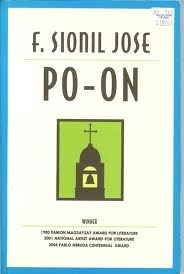Michael Forester's Blog, page 3
November 17, 2017
Blogpost 105: Review of Noli Me Tangere by Jose Rizal
5 Stars *****
Jose Rizal was not so much a novelist as a revolutionary who fought with a pen. This book is not so much a novel as an incendiary device flung deliberately and accurately into a lake of heated gasoline.
I could waste my time and yours expounding its plot or criticising it stylistically. But to do so would miss entirely the point of its having been written. For, in the way of revolutionary works, it articulates and encapsulates the emotional and physical agonies of an oppressed people; the powerless abused by the power holders, whose control emanated from gripping the beliefs of an uneducated people by the jugular and squeezing in order to suck out their life energy and perpetuate their subjugation.
This is book that invokes reader anger, yet is written without the need for authorial anger. For in the simple fictionalisation of what he observed around him, Rizal illuminates the hypocrisy of hijacking religious belief as a tool of oppression. When we see the physical, emotional and spiritual abuse he describes so simply, he does not have to conscript us into his revolutionary army. For we grab our pen, his pen, any pen, to mark our X onto the dotted line, enlisting willingly and committing to his cause for life.
This book does not distinguish itself as a novel but rather as a revolutionary tract. And as such, it is devastatingly effective. Rizal is more than a hundred years dead, yet still he compels me to take up arms and follow him. Noli Me Tanjere is already compulsory reading for all school students in the Philippines. It is also vital reading for anyone who wants to understand, not just why the Filipino revolution occurred, but why any revolutions occurs anywhere.
Classes of the powerful that exploit and abuse and subjugate, be warned: the poor may well always be with us but they are no longer voiceless. Rizal and those that trod his path are their mouthpiece, their trumpet, their megaphone. From the grave he still accuses you in the courtroom of history. But in this courtroom is a jury you cannot bribe, for we know what you have done for generation after generation and are still doing today.
We have read Noli Me Tanjere and we are coming for you.
Michael Forester
17.11.17
The post Blogpost 105: Review of Noli Me Tangere by Jose Rizal appeared first on Michael Forester.
October 6, 2017
Blog Post 104: The Last Friendly Days
 She grows frailer, this Summer. She does not stride with the same confident gait over the heather-stained heathland as once she did. Weary of her old green coat, she pleads for the new colours of the coming season. She tests her pallet for effect before committing herself and dabs the most fashionable of the trees, while the bracken below dulls and crisps to brown. Terracotta and rust are the new green.
She grows frailer, this Summer. She does not stride with the same confident gait over the heather-stained heathland as once she did. Weary of her old green coat, she pleads for the new colours of the coming season. She tests her pallet for effect before committing herself and dabs the most fashionable of the trees, while the bracken below dulls and crisps to brown. Terracotta and rust are the new green.
The tourists are dispersing now, their caravans and campervans depart in lines like soldier ants, leaving the Forest to us as the sun prepares to sleep. We do not mind the tourists. They arrived by BMW on the road from London and depart by Mercedes on the road to Brussels. Mostly, they are harmless, spending their pounds and euros and dollars in support of local industry. Mostly they leave only tyre-tread marks (and perhaps, if they are careless, their litter), taking back with them a little joy and a hand-crafted souvenir in return. It is a fair trade. For thus they support those of us who live and labour here – the bicycle-hirers, the commoners, the Tarot readers, the light workers, the authors. All are foundational to the cycle of Forest energy.
And the Forest: she, too, is martialling her industrious. Her dryads urge their tree-flocks to draw back the sap from the spent energy of the leaves, so as to weather the gathering storms of another coming winter. For the last days of friendly weather are almost behind us.
 Bypassing the popular beauty spot of Balmer Lawn, we come to Ivy Wood. We have learned to choose the paths less travelled by and declare with Robert Frost that this is what makes all the difference. And yes, the wood is yellow, for the leaves are beginning to drop. Here, where the River Lyndhurst meanders, procrastinating like a reluctant bride on its way to meet the Solent, we are less well acquainted with the dryads who graze their trees in this place. They close about us, curious, and perhaps a little suspicious, as to our intent in invading their space.
Bypassing the popular beauty spot of Balmer Lawn, we come to Ivy Wood. We have learned to choose the paths less travelled by and declare with Robert Frost that this is what makes all the difference. And yes, the wood is yellow, for the leaves are beginning to drop. Here, where the River Lyndhurst meanders, procrastinating like a reluctant bride on its way to meet the Solent, we are less well acquainted with the dryads who graze their trees in this place. They close about us, curious, and perhaps a little suspicious, as to our intent in invading their space.
Matt continues to behave as if he were three years old, darting into the undergrowth in pursuit of quarry he will never see, let alone catch. And in this I am cautioned as to my own inclination to pursue what I cannot possess, to possess what I cannot use, to resist what I cannot prevent. Nevertheless, he emerges back into daylight, ready to suck the last sap of joy from each new day.
back into daylight, ready to suck the last sap of joy from each new day.
We value these last friendly days so much, for we know the fall of autumn portends the coming of the darkness. These days are the last before the dying of the light; the last before we, too, must hunker down to weather the inevitable. We cannot prevent the dying of the light, we can only use each shortening day to best effect. And thus, as we have ever done, we walk together in a forest that wants us and energises us. Dare we say, ‘loves us’?
He is old now. In the way of dogs, sometime along the journey his ageing overtook mine. And here is the crux of it: I do not know if he will find his way through the treacherous undergrowth of this coming winter, to emerge unscathed into the sunlight of another spring. As the dryads begin the slow bedding-down of their flocks for sleep and the energy quietens, I am confronted by the long-avoided inevitable: that our days together are numbered.
And it is here, in this emotional space of heartstring love, that I battle with my calling, my inclination, my essence. For I am asked to travel more now. Yes, I will of course go whither the light leads me. But there are places to which I must venture that he cannot come. And the days we spend apart draw us closer to our final parting. There is no solution to this dilemma. It is but another gong-an that directs us towards eternal consciousness, the relinquishing of ego, the quietus of the self.
This winter two foreign tours have beckoned. To have accepted both would have taken too many days from our rapidly emptying store house of time together. So I have compromised. I have accepted the invitation to speak in the Far East but postponed the American invitation until 2019.
Perhaps by then the dilemma will have been resolved by the natural order. When the time comes, I know he will not rage, for rage is not his way. But I will rage, for I feel it rising already in anticipation of what I cannot prevent. I will rage, yes, I will rage, rage at the dying of the light. But I will rage all the more at myself for the days I did not spend with him. And when that unwanted, devastating day is upon us, rage will be far too tame a word. For our heart-strings torn asunder will resound from Olympus to Asgard and the dragons will scream their mourning at his passing.
I am sorry, but I cannot finish this post. I can write no more. I do not want winter to come. I do not want my dog to die. .
.
The post Blog Post 104: The Last Friendly Days appeared first on Michael Forester.
September 13, 2017
Blogpost 103: Review Of Exit West by Moshin Hamid
In a generic, nameless city, somewhere in the conflict-ridden middle-east, a young couple fall in love. As their relationship grows, fearing for their lives, they are forced into migration.
This is the story common to a number of human beings, so countless in our age as to threaten to numb us, by helplessness, into inaction. The genius of Moshin Hamid lies not only in his observations of the power of the fundamental urges that drive our lives, but also in his utilisation of a form of narration that intensifies our ability to relate to this all-too-common story.
Narrated much as a storyteller might speak a tale in simplicity to a campfire audience, Exit West is a fable, utilising a minimum of dialogue. It is rendered all the more poignant for the fantasy-like quality so created. This slightly distant, almost detached form of storytelling so understates the gravity of the story that it allows the power of the world-scale events in the narrative to speak directly to the reader. We are thus forced to confront all the more clearly the profound human reality of the almost overwhelming events that confront us in our nightly newscasts.
With a magical-realism element that resonates back to C S Lewis’ Narnia fables, this book employs elements of fantasy that serve the writer’s purpose without ever becoming his master. As a result, the book sharpens its story to pencil-point relevance.
Hamid exposes the 21st Century phenomenon of mass-migration, projecting it through the vehicle of magical realism into something personal, something intrusive, something inescapable. In short, he forces me to confront what it actually means to be a poverty-stricken migrant. Yet at the same time the narrative will not let me escape the implications of these multiple diasporas to the communities at the destination end of this vast displacement of humanity into the places we call home. The homeless and the invaded are forced, through unrequested and unsanctioned coexistence, to confront the extremes of the human response, from open-armed generosity through to grim-faced defence of what is owned and valued.
Hamid successfully conveys the sense that migration is inescapable for those it captures, confronting increasing proportions of recipient countries’ population with the realities of displacement – the rootlessness, the poverty, the appropriation without permission, of the basic necessities for sustenance of life, and the rejection that diminishes us all. This is a world in which it matters nothing what your previous status was, what education you had, what professional skills you possessed that somewhere and somewhen else were once valued. Now all are reduced to the base denomination level of existence that elevates the fundamental necessities of life to an all-consuming priority.
We cannot escape the reality that this is the problem confronting the many not the few, that problem that will eventually confront all of us. Hamid therefore forces us to take ownership of our own reactions and instincts, making us shudder as we confront the limits we draw to our declared morality.
My only disappointment with the book is that the intensity of its engagement with the reader declines towards its end, leaving me with the feeling that this already short novel would have been all the stronger for being about 20% shorter still. For me, therefore, Exit West falls just short of being a great novel. It nevertheless deserves its place on the 2017 Mann-Booker shortlist. Perhaps it deserves to win.
Michael Forester 13.09.17
The post Blogpost 103: Review Of Exit West by Moshin Hamid appeared first on Michael Forester.
August 25, 2017
Blog Post 102: A Review of F Sionil Jose’s Rosales Novels
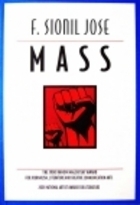
When I visited the Philippines for three weeks in February-March 2017, I asked to see some examples of Filipino literature. I was directed first to Jose Rizal, which resulted in a profound and unforgettable personal encounter with this national hero-poet, of which I have written elsewhere. However, I was later given, as a leaving gift, the Rosales Saga by F Sionil Jose which I have been reading since my return home five months ago.
Jose is a difficult author to review literarily, particularly looking back over a distance of thirty years since the series was completed. I cannot say that I found these books to be of outstanding literary merit, being more plot than character driven and in a prose style that is engaging more than gripping. Nevertheless, I still hold the books, particularly ‘Po-On’ which starts the saga and ‘Mass’ which completes it, compelling because of their prime historical significance.
Here is the history, set down in a fictionalised, highly readable story, of the struggle of an exploited people. In ‘Po-On’, Jose draws us inexorably into the lives of a family, one of numberless families, yearning simply for the right to live, their traumas at the hands of an unforgiving natural environment, their suffering under the exploitation of a powerful church and powerful landowners. The experiences of later generations of the same family are explored in ‘The Pretenders’ and ‘My Brother, My Executioner,’ culminating in the violent revolution of ‘Mass’.
And it is in ‘Mass’ that Jose finally confronts explicitly the core issue that lies at the centre of the multi-generational struggle he has traced through four volumes: the unremitting dedication of the powerful to the exploitation of the powerless. The cynical disregard for the consequences of the exploitation of the many by the few is admirably summed up by Jose’s antagonist thus: “Let the scum fight for the crumbs. Ours is the cake… And we are not going to give this cake away… We are going to be here… for always. We know how to change, and that is why we will always be on top. But the change comes from us, dictated by us. Their perception… is dictated by their needs, and we will give those to them slowly, slowly. Never the pie, just the crumbs. Yes, we will talk about social justice, land reform. But we will not give these in cash or in kind. We have to keep them nailed to the plough, to the machine. And we will do it deliberately… And we will not give it up. Only the powerful understand… the impulses of power. And the powerful are the rich. Study your history books… Have they really abolished the elites in Moscow? In Peking? They will always be with us, like death and taxes.”
So I look back over the thirty years since Jose was writing, for these have been the years of my own life. And I want to ask Jose a question, but for the fact that I already know what his answer would be. The question is ‘What has changed since you set down this history?’
In Manila the substandard housing is being cleared, the population moved out for the inexorable march of the high rise building, the corporation, the dollar. And London is the same. And Los Angeles and Philadelphia and Toronto and Sidney are no different. So the eye answers the question saying that much has changed, much is better. But the heart, the heart cannot agree, for the heart is uneasy that the powerful are still the rich and, like death and taxes, always with us.
And therefore these books, and Mass in particular are recommended, particular to my many Filipino friends to whom I say, if you want to understand your own history, your origins, the struggle of your people, first read Jose Rizal. Then read F Sionil Jose. And do not let ‘Mass’ be the end of your history.
Michael Forester
23.08.17
The post Blog Post 102: A Review of F Sionil Jose’s Rosales Novels appeared first on Michael Forester.
August 5, 2017
Blog Post 101: Time’s Fool
20
When I first began to look for a man
I was seeking for someone to love me.
So I danced in the disco from LA to Frisco
just looking for someone to love me.
I was on the attack. I was great in the sack –
but I just wanted someone to love me.
Now I’m smothered in make up and quick on the take up
and pretty soon someone will love me.
My heels are six inch; getting guys is a synch!
And someone out there’s gonna love me.
 30
30
Now I drink Gin and Tonic; my style is iconic.
I’m confident someone will love me.
My beauty’s cosmetic, my boobs are synthetic
and all cos I want you to love me.
Hey, you look debonair. Let’s have an affair!
cos I really do want you to love me.
Your house is palatial – just pay for my facial –
I’m certain that soon you will love me.
You drive a Ferrari? Take me on safari
for honeymoon – that’s where you’ll love me!
40
We’ve got friends, ten a penny, but haven’t got any
who’ll help me to get you to love me.
I’ll give birth to your baby, then maybe – just maybe –
there’ll be someone here who will love me.
My beauty is heightened. I’ve had my teeth whitened
in order to get you to love me.
I’ve been under the knife just because I’m your wife.
So why is it you still won’t love me?
 50
50
You used to caress me – so why have you left me?I just wanted to know that you loved me.
Now I dress in Channel and I wear it so well
‘cos I really want someone to love me.
I’m smothered in Lancome so why won’t a man come
who’ll take me away and just love me?
60
Now my age I’m defying – so why am I crying?
All I want is for someone to love me.
70
There’s no one to love me.
Love’s too far above me.
Please, tell me why I cannot love me.
The post Blog Post 101: Time’s Fool appeared first on Michael Forester.
May 28, 2017
Blog Post 100: Voice of the Turtle
 It has been a harsh and silent winter. The energy has slept, voiceless, under the snow blanket for longer than we are used to. It has become difficult to believe that green shoots will ever emerge. The words that cascade through the Summerlands have not come. We have been unable to write for some time now, perhaps for many months – we cannot remember how long. No poetry; no prose. Each attempt produces jagged, awkward phrases, malformed paragraphs and stanzas that hides in shame from the angry eyes of other men’s judgement. Our blog has languished un-posted and our online entries have been confined to old material and the kind comments of those who understand there are times when we cannot be creative.
It has been a harsh and silent winter. The energy has slept, voiceless, under the snow blanket for longer than we are used to. It has become difficult to believe that green shoots will ever emerge. The words that cascade through the Summerlands have not come. We have been unable to write for some time now, perhaps for many months – we cannot remember how long. No poetry; no prose. Each attempt produces jagged, awkward phrases, malformed paragraphs and stanzas that hides in shame from the angry eyes of other men’s judgement. Our blog has languished un-posted and our online entries have been confined to old material and the kind comments of those who understand there are times when we cannot be creative.
But winter is a season familiar to us. And we have learned that instead, we must devote our time to the practicalities of being an independent author, selling and distributing our existing work.
Today, we visited the New Forest town of Fordingbridge to drop off stock at local landmark #Fordingbridgebookshop. Job complete, we take an hour out to walk at #FroghamCommon, where we used to walk daily when we lived here, until 2015. Nothing has changed. Matt seems to remember the place. Time was when he would rush about the Common in an interminable frenzy of rabbit-chasing, imaginary and real. I am glad that in his whole life he has never caught anything. It does not matter to him. The joy is in the chase. But now he is old, 99 in dog years, and we no longer live in Frogham. He is content, for the most part, to walk beside me, disappearing momentarily into the gorse, drawn by some lingering shadow-memory of the almost-caught that is the preoccupation of the rapidly aging, canine and human.
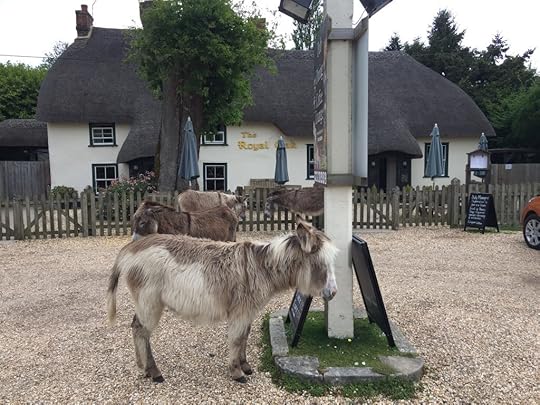 We turn to head for home, but not before we visit the iconic #RoyalOak pub at #Gorley, where one of us consumes a traditional New Forest Ploughman’s lunch. We shall not disclose which of us it was. Then it is time to make our way south again, towards the coast and home, where we shall prepare for next week’s visit to the Hay-on-Wye Festival.
We turn to head for home, but not before we visit the iconic #RoyalOak pub at #Gorley, where one of us consumes a traditional New Forest Ploughman’s lunch. We shall not disclose which of us it was. Then it is time to make our way south again, towards the coast and home, where we shall prepare for next week’s visit to the Hay-on-Wye Festival.
We are writing again now; just a little you understand. It feels like the early snowmelt when spring comes to the high Alpine country. We are laying the foundations for the third and final novel of our trilogy, ‘Maranatha.’The first two volumes, ‘Vicious’ and ‘Too,’ are complete and are scheduled to appear in 2018 and 2019 respectively. Our attention has turned to the third and final volume (working title ‘Deus’), whose skeleton is begining to form as spirit stirs the dust, as it did to form the first man. Background concepts come into focus. Lines of verse appear. Paragraphs of dialogue begin to crystalise.
Renewed creativity, like the first snowmelt, is sweet, but is slow to reach the low country of the pen. Snowmelt does not struggle. Though its progress may be impeded by winter detritus that has built up in the unused streambeds, the gentle call of the sun, sparkling upon the frozen silence of winter, cannot be ignored. Drop by drop the power builds, until it breaks through, as springtime after springtime, year by year, it has always done, to cascade headlong down the mountainside, growing in force, unstoppable, flushing out the debris of winter and bringing life to thirsty land below.
So now we do as we have always done. And when the spirits speak we pull off the road, extinguish the engine and gather the sweetwaters before they can be drawn down into the long-parched thirsty earth to be lost forever.
There have been times in the silence of the recent weeks when we have wondered if we would ever write again. But now, once more, the words are our domain and we feel the power pulsing through the conduits of the soul once more. There is no novel yet. There is only the earliest hint of the skeletal structure of a novel. But we recognise this land. We have lived in this country before, even if, for the moment, we feel ourselves interlopers. This land is the bedrock on which we will fabricate the edifice to come. Breaking dry ground does not come easily. Many tools will be broken, expended, discarded, in the excavation of this foundation.
But we know what it is to live with the pulsing respiration of our own fluctuating emotions. And we have soujorned long enough in the frozen mountains. With the breaking of spring, it is time to return to the summer grazing of the Alpine Meadows.
At last we are writing again. ‘The flowers appear on the earth; the time of the singing of birds is come, and the voice of the turtle is heard in our land.’
And we know why we were born.
22.05.17
April 18, 2017
Blogpost 99: Guest Post by Sara The Little Book Blogger of Jay Asher’s ‘Thirteen R3asons Why’
Thus post has been written by guest blogger Sara, of ‘The Little Book Blogger. The original can be read at:
http://thelittlebookbloggeronline.wee...
Thank you Sara, for bring this book to our attention. and thank you Jay Asher for bringing this issue to our attention
Michael Forester
Sara writes:
This isn’t a full review but a discussion which will contain spoilers to read my full spoiler free review visit-
https://www.goodreads.com/review/show/1959237806?book_show_action=false
For help and support surrounding the issues discussed in 13 Reasons Why (book or TV show Please Visit-
http://13reasonswhy.info/#usa
Id love to know what you thought of the book which is why I haven`t said much so carry the discussion in the comments below!
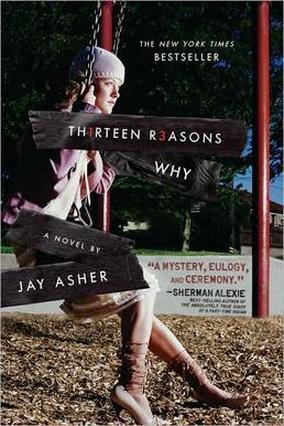
I was a sufferer of bullying and I think the message of 13 Reasons Why is so important- “Everything affects everything.” People need to better understand how hurtful what they’re saying is. I didn’t think it would get any better but thankfully it did and I never got to the stage Hannah did of considering to take my own life or actually doing it. However, so many teens and even adults do end up in the same mindset as Hannah and I`m glad 13 Reasons Why tackles that. I think I was drawn to this book because I knew it wasn’t going to wash over the subject like so many others do. Jay Asher I thank you for doing what so many others couldn’t. I never thought I`d be able to talk about being bullied until I read this book and watched the show. I think 13 really addresses real life issues faced by teens everyday and I spoke about this in my book review and TV review. The character of Hannah for me represented a lot of teens and how they are feeling and Jay Asher made sure he spoke for a majority of people and victims. Society generally views a lot of the issues Asher addresses as taboo subjects when in fact they need to be talked about more and dealt with more effectively.
This book mainly focuses on 2 characters- Clay and Hannah. Hannah`s voice is heard through a series of tapes and Clay comments on each respective tape and gives his own accounts on some of the events mentioned in the tapes. Other characters include Tony who is keeping a second set of Hannah`s tapes as she requested and often follows the tapes receiver at the time. Tony also supports Clay as he here`s the reason he is on the tapes. A few other characters have appearances but mostly only feature if on the tapes which differs from the Netflix show where they have bigger roles. The ending is also slightly different and doesn’t leave as much room for a sequel as the show does.
I really enjoyed the book and if you haven`t read it and enjoyed the show I definitely suggest it. However, the pace and overall flow of the book is a little slower than the show and may be a little more confusing to follow but that doesn’t take away from the overall reading experience.
SPOILERS AHEAD
I would like to point out some of the moments that change in the show.
In the show the order of how the recipients receive the tapes changes slightly however not much is affected by this in terms of plot as Clay doesn’t speak to the people on the tapes with the exception of Marcus.
In the book Clay passes the tape of to a characters who is essentially the Cherry character but has a different name. Before passing on the tapes he doesn’t leave a 14th tape as far as we know and he doesn’t speak to the guidance councillor who is on the final tape.
Hannah`s parents aren`t as involved with the plot of the book so I was more emotionally dedicated to the TV show as we got to see the full affect of suicide on all the people involved in Hannah`s life.
April 7, 2017
Blog Post 98: Party Invitation
Gonna send an invitation out to every goddam nation.
Come on guys, we’re gonna to have a bash.
400,000’s quite a number – hit ‘em while they sleep and slumber.
Come on guys, we’re gonna have a bash.
We’ve come to play! There ain’t no rules here, we’re just into burning schools here.
Come on folks, we’re havin’ such a bash.
Pour that acid down their britches – that’ll get ‘em all in stitches!
Come on guys, an’ help us have this bash.
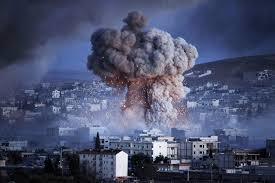
Hi there Vlad, there’s no disputin’ – Sunni kids was born for shootin.’
Glad to have you here at Bashar’s bash.
Kill their sons and rape their daughters – Shiite kids was made for slaughter.
We’re so glad you’re here at Bashar’s bash.
Help unpack this Sarin shell – it’s gonna blow ‘em all to Hell
And Bashar’s bash is gonna be a gas.
The UN’s too preoccupied to waste its time on genocide
And intervene down here at Bashar’s bash.
If they ask you, keep it vague – they’ll never get you to The Hague.
So come on guys an’ join in Bashar’s bash.
Donny’s missiles just stopped crusin’ – let’s get back to more abusin.’
Come on folks, we’ll all join in the bash.
This’ll get the Saudi’s coinin’ – then perhaps the Brits May join in.
Come on guys, there’s money in this bash.
And if the outcome’s still unclear we’ll turn it thermonuclear
Cos no one’s had a bash like Bashar’s bash.

So look upon the devastation implicating every nation –
All are partying at Bashar’s bash.
And everyone can clearly see there’s no responsibility
If things turn bad here down at Bashar’s bash.
Cos out here on the desert sands we’ll call for bowls to wash our hands –
Hold no one to account for Bashar’s bash.
Come all and warm your vanity on the bonfire of God’s sanity.
In Allah’s name we undertake this bash.
© Michael Forester
April 3, 2017
Blog Post 97: Where’s My Phone

What’s your reaction when you lose something important? It used to throw me into an abject panic as I considered the potential consequences of my loss, the ramifications sometimes seeming well beyond the rational. I look back now and observe with some amusement how welded I have been to my plans for my life, how difficult it has been to consider possibilities outside of the planned.
Yet I observe now that, whether I ever recovered those seeming lost items or not, life carried on regardless. If they were lost forever, I made an adjustment, however initially painful the reordering of my myopic little world, and carried on with a new plan, oblivious to the fallibility of the planning process itself.
With a little more learning behind me, when I mislay something significant now, I am more inclined to smile. For I have come to understand that a major loss will commonly result in an opportunity for intervention from my angels, a learning opportunity, a chance to grow as a result of the divestment of what I no longer need but have kept out of habit, or sometimes all three.
So when, on Sunday evening, shortly before bedtime I discovered that my mobile phone had been missing, the loss itself felt auspicious and I knew something would likely happen that mattered more than the loss itself.
I first searched my flat, checking every possible location in which I might absent-mindedly have put down or perhaps dropped it (yes, hard to believe I know, but I do that occasionally), but the search yielded nothing. All the items that I carry with my phone – my keys, my wallet and so on, were sitting quietly where they were supposed to be. All smiled at me questioningly. They evidently knew what was afoot. None of them let me in on the secret though.
So I told a few people by e-mail that the misplacement would mean no text communication until the phone, or the reason for its absence surfaced. Then I asked my angels to help me find it.
The phone did not appear.
Then I realised I’d made the wrong request of my angels (I generally find I have to be specific in my requests – for they are inclined to respond to the request I have made, not the one I meant to make).
“Ok angels,” I said, “Please show me where my phone is.” I stopped looking and waited for the answer to surface through my unconscious into my conscious mind in the normal way. I knew it would come.
Only it didn’t.
No answer, no phone, no intervention.
Unruffled, I smiled again. “All is well in my world,” I found myself responding to a well-meaning sympathiser, sympathy rarely being useful, of course. “All is as it should be in the moment.” And then I went to bed and slept soundly, just after Matt walked all over me for his night ime cuddle, reminding me of what really matters in my world.
I rose up into consciousness the next morning, aware that some sort of action would be necessary. The semi-conscious state, that space we cross from sleep to wakefulness, is enormously useful, I find, for creative thought, for active engagement with my guides and angels; but not it seems, for locating misplaced mobile phones.
I did recall the last place I thought I remembered using it though – a dog friendly café in Lyndhurst where we had stopped the previous afternoon after walking in the Forest. I decided it must be there that I had left it. But I wake early – too early for the average café to be open, and there was no point in rushing off. So, after Matt’s walk we set out to drive back to Lyndhurst where we would join the early risers of the locality in Costa – the only café I know that keeps anywhere near the same hours as I do.
And as I drove I meditated on how far my role models went out of their way to divest themselves of distractions in the pursuit of their life purposes – The Christ, whom, so far as we know, never wrote so much as a single book or owned objects of perceived worth; Ghandi who eventually owned nothing and dressed in a homespun loincloth; Mother (now Saint) Teresa, who discarded all, so that she might embrace the discarded. And I thought about what a good opportunity this loss might afford to tread in some of the footsteps they left in the sand for me to follow.
We arrived at Costa -I do so love their coffee (for now, anyway) – and I read the newspaper, as from habit I do all too often. It told me of a world of pain and negativity – the vast sea of souls washing into Europe from Africa and the Middle East, fleeing terrorists, hell-bent on pursing them and us and me with their particular vile brand of odious pestiferousness. I read of the manipulation of millions in the power struggle of elites that is the UK Brexit. I read of the emotional opportunism and intellectual poverty of those empowered in the United States of America. I contrasted all that with the warm-heartedness and love I perpetually encounter amongst those I engage with on social media, children of light who seek the light. And I resolved to read the news a little less, and meditate a little more, in pursuit of my own life purpose.
Then it was time to go to the café where I would retrieve my misplaced phone that I was confident would be in the possession of the proprietor, whom I would thank with a sheepish smile.
Only I didn’t.
Because there was a hastily hand written sign on the door that said ‘Closed to day for personal emergency. Sorry for any inconvenience.’
I giggled.
Not at the poor proprietor who had an emergency to deal with; but at myself for my presumptuousness. And I saw again that vision that sometimes comes to me – the one of my Guide leaning nonchalantly against the wall, legs crossed, arms folded (though sometimes he has his hands in his pockets) whistling up into the air with a wry smile on his face. And I blessed him for the opportunity for not taking myself too seriously, and for the certainty that something wonderful was about to happen.
But my phone did not appear.
So I thought it a good idea to drive to Tesco, my airtime supplier and have the service cut off in case someone was phoning Kuala Lumpur at my expense, How protective of my money I still am. How far I still have to go in following the divestment examples of my role models. Then, quite suddenly, as we arrived in the town, driving past my own flat and on to Tesco, it came.
Not in a whirlwind, not in a fire, but in a voice that was not mine, yet not, not mine. A statement of such profundity I failed initially to appreciate its significance.
“I am done with experiencing my being negatively,” came the sentence. I noted it, a very particular and unusual form of words. But I did not understand it.
 We drove on to Tesco, had the account switched onto a new SIM card and checked that the phone had not been operated since the last time I remember using it. Then I drove home, still oblivious to the consequence and meaning of the tsunami that had just washed over me.
We drove on to Tesco, had the account switched onto a new SIM card and checked that the phone had not been operated since the last time I remember using it. Then I drove home, still oblivious to the consequence and meaning of the tsunami that had just washed over me.
Arriving home, I took out a CD of Tibetan singing bowls that I had bought the previous day in a mind body spirit fayre in Lyndhurst, recorded by Ven. Chris Burrows. I had taken a chance on buying it, knowing that even if I could not hear the note of some of the bowls, I would still feel the vibrations. And as I walked into the study to put the CD case on my desk, I stopped.
It was there; under my chair. I stood in the doorway and looked at it not knowing what to do, frozen in incredulity. The little black object that contains so much of my life and ability to communicate, lay on the floor directly under my chair.
Now, you’ll maybe say, as I did, momentarily, “It was always there. You just didn’t see it…somehow… for some reason.”
And maybe you’d be right. And maybe the astonishing significance lies in the ‘somehow… for some reason.’
And maybe you’d not be right. And maybe it had not been there. Only now it was.
Because whether you’re right, or whether you’re not right, it hit me just the same; with the full force of that delayed Tsunami, it hit.
The koan, the gongan-nature of the event was beyond mistaking. And the energy of its intervention threw me full force against the inestimable magnitude of that life changing statement, “I am done with experiencing my being negatively.” In that moment came the awareness of the beyond-identity, cascading down, and in and up and out, blinding in its force of revelation. Confronting me with the new reality – that I am not an individual being; that the I of the me is not a sole inhabitant of my body, that our soul connection goes inestimably beyond the individuality of my perception, that all the protectiveness I have built up, the unrecognised negative on which I have built my ramparts, the false belief that others are different, separate, threatening, dangerous, other in their otherness, in their unconnect.
All melted in the heat of the light. And I howled to heaven. And I wept and I laughed – a holy spirit baptism in which I spoke poured out in the tongues of men and angels in reverence to and declaration of the revelation and to the light and the grace and the love of enlightenment.
Have you seen it yet? Have you seen it in this lifetime, I mean. For we all do see it when we return home from this life and before we incarnate again. When we slide back into the arms of god we know the join-edness of unified integration. The sea of souls is one sea.
And we are but flying fish,
breaking the surface for a moment,
to bask in the reflected glory
of a transient elevation.
Namaste.

March 6, 2017
Blog Post 96: Deja que un ser amigo
Deja que un ser amigo
For Jose Rizal
Nole me Tangere, brother mine;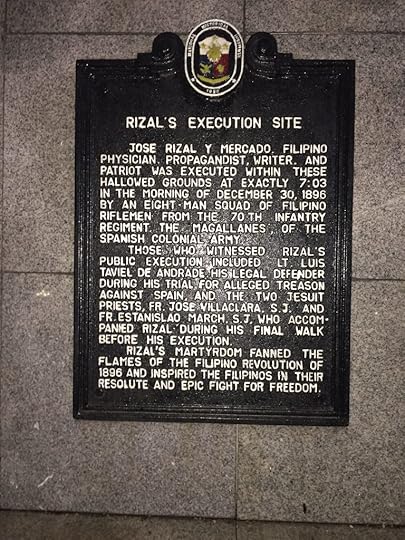
not while my words kneel weeping where you fell.
Shield me in you shadow, mi hermano
and I will place my hands around your own.
I see the pen you hold, Jose
My wrists are shackled to your stake.
I feel the bullets bite
and I am drowning with you in vermillion pools.
En buen hora, mi hermano.
Tu sangre cubre el suelo Filipinas.
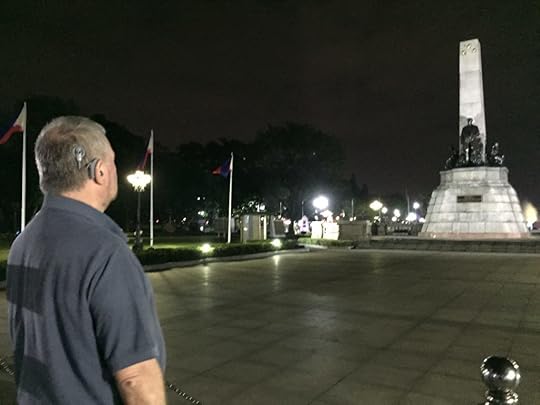 Hold me while I fall into your grave, oh brother mine.
Hold me while I fall into your grave, oh brother mine.
E voy donde con usted no hay esclavos.
Sooth my soul, Jose.
Take my hand in yours, as now you fly.
I came only to share light.
But you have shone your lamp across my path
and shown me what you bought with blood.
Surely yours was the writer’s journey more than mine.
Find favour in my following, Jose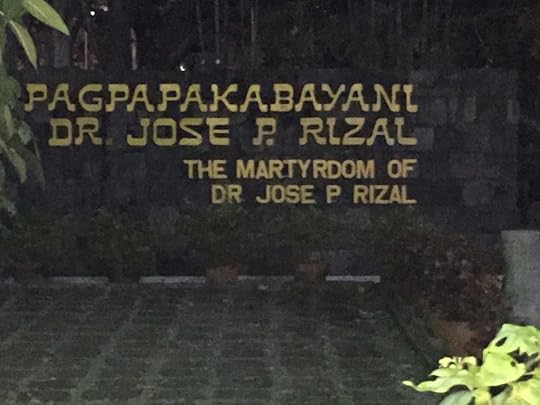
and in your shadow shall I walk,
writing with the ink you turned to blood.
And when my pen has summon thunder, as did yours,
this will be the epitaph that I shall write:
Here lies one who found his heart in persecution,
who crossed his pen with steel,
then laid him down so silent in an unjust shallow grave.
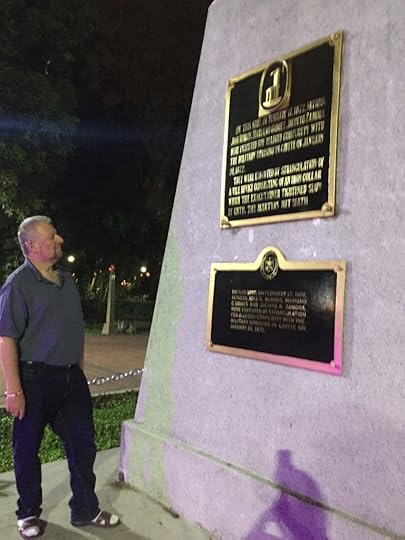 Have they seen, amado hijo?
Have they seen, amado hijo?
Has your light soaked deep into this soil?
Your pen is speaking still, Jose,
pouring out the poet’s cry for liberty.
Your dying hand will not lie still
pealing to the pain that seeded this land’s soul.
© Michael Forester
Manila
3rd March 2017
“I believe in revelation, but in that living revelation which surrounds us on every side, in that voice, mighty, eternal, unceasing, incorruptible, clear, distinct, universal as is the being from whom it proceeds, in that revelation which speaks to us and penetrates us from the moment we are born until we die.”
Jose Rizal 1861-1896





